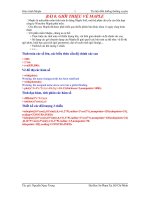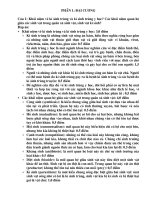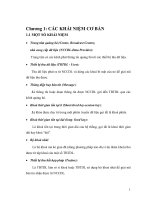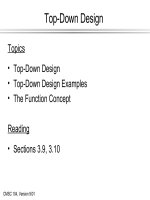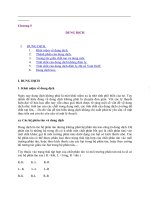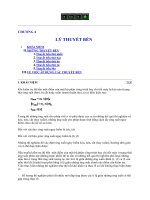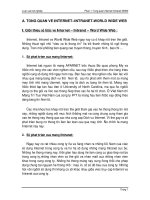Tài liệu Exit Without Saving pptx
Bạn đang xem bản rút gọn của tài liệu. Xem và tải ngay bản đầy đủ của tài liệu tại đây (100.25 KB, 17 trang )
Exit Without Saving
Nestvold, Ruth
Published: 2006
Categorie(s): Fiction, Science Fiction, Short Stories
Source: />1
About Nestvold:
Ruth Nestvold is an American Science fiction and Fantasy writer. Born
in Washington and raised in Oregon, she now lives in Stuttgart, Ger-
many, where she works in technical translation and localization. Her first
professional publication was "Latency Time," published in Asimov's
Science Fiction in 2001. Since then, her short fiction has appeared in nu-
merous publications, including Realms of Fantasy, Sci Fiction, Strange
Horizons, Futurismic, and several year's best anthologies. In 2004, her
novella "Looking Through Lace" was short-listed for the Tiptree Award
and nominated for the Sturgeon Award. In 2007, the Italian translation Il
linguaggio segreto won the "Premio Italia" Award for best work of sci-
ence fiction or fantasy translated into Italian in 2006. She is also a regular
contributor to the Internet Review of Science Fiction. Source: Wikipedia
Copyright: Please read the legal notice included in this e-book and/or
check the copyright status in your country.
Note: This book is brought to you by Feedbooks
Strictly for personal use, do not use this file for commercial purposes.
2
License
"Futurismic is a free science fiction webzine specialising in the fact and
fiction of the near future - the ever-shifting line where today becomes to-
morrow. We publish original short stories by up-and-coming science fic-
tion writers, as well as providing a blog that watches for science fictional
news stories, and non-fiction columns on subjects as diverse as literary
criticism, transhumanism and the philosophy of design. Come and ima-
gine tomorrow, today."
This work is published using the following Creative-Commons license:
Attribution-Noncommercial-No Derivative Works 3.0 Unported
You are free:
• to Share — to copy, distribute and transmit the work
Under the following conditions:
• Attribution. You must attribute the work in the manner specified
by the author or licensor (but not in any way that suggests that
they endorse you or your use of the work). Attribute this work:
What does "Attribute this work" mean? The page you came from
contained embedded licensing metadata, including how the creat-
or wishes to be attributed for re-use. You can use the HTML here
to cite the work. Doing so will also include metadata on your page
so that others can find the original work as well.
• Noncommercial. You may not use this work for commercial
purposes.
• No Derivative Works. You may not alter, transform, or build upon
this work.
• For any reuse or distribution, you must make clear to others the li-
cense terms of this work. The best way to do this is with a link to
this web page.
• Any of the above conditions can be waived if you get permission
from the copyright holder.
• Nothing in this license impairs or restricts the author's moral
rights.
3
Exit Without Saving
Spending credit illegally was difficult, but there were ways, if you were
clever. There were always ways. Using a morph unit illegally was even
more difficult, but to Mallory it was worth the risk.
Friends like Lorraine made it possible. Lorraine was a lab technician
for Softec, and she was both clever and greedy; to make a little extra on
the side, she allowed Mallory to use the units during off hours. Mallory
had no idea if any of the other morph agents were also clandestine cus-
tomers — Lorraine could be trusted to keep her mouth shut.
“I don’t understand why they don’t market these things for entertain-
ment purposes,” Lorraine said as she adjusted the download cap on Mal-
lory’s head.
“I’m testing them for that,” Mallory said, grinning.
Lorraine frowned. “It isn’t a joke. Softec just lost Max to identity
scramble last month. You be careful, girl.”
“I am.”
“Hope so. Another thing I don’t understand is why you of all people
feel the need to change shape.” She looked pointedly at Mallory’s bare
breasts, which men had a tendency to describe as perfect.
Mallory glanced in the mirror behind Lorraine and shrugged. She
might not have anything to complain about as far as her own appearance
was concerned, but that wasn’t the point. As a morph, she wasn’t tied
down to herself, to her own identity; she could get out of it, escape to
any shape she wanted, be anyone she wanted.
“It doesn’t have anything to do with that, Lorraine.”
“Yeah, I know. You’re just not an easy gal to satisfy. Now lie down.”
Looking grim, Lorraine hooked the body Mallory would soon be leaving
to the life support system.
Some agents disliked the sensation of the actual morphing process.
Mallory was not one of those. As she settled into the cushioned pallet,
her stomach was churning in anticipation. On the other side of the trans-
feral equipment was the long, dark morph unit. It looked inanimate, but
it was actually a DNA matrix controlled by a neural network. With the
mind upload, it would become her home for a couple of hours, and with
its assembler technology she could become anything she wanted to be.
“Ready.”
But Lorraine didn’t start the download immediately, looking instead
at Mallory with something other than greed in her dark eyes. “You make
4
sure you tell me if you ever start feeling the effects of brain drain, you
hear?”
“Of course,” she replied impatiently. It wouldn’t happen. Her extra ex-
cursions were nothing. She’d never had a bout of dizziness, let alone the
more serious symptoms like a fainting spell.
Finally Lorraine began the transferal, and Mallory felt a sense of ela-
tion as her mind left her body. She was free.
“Transferal complete,” Lorraine said. “Begin anthropomorphing
process.”
The unit began to take on human shape and sensation, and once done,
Mallory adjusted the appearance of the morph to be her own twin, a
double of the empty husk lying in the body case on the other bed. She
would change that soon, but she had to leave the Softec complex as she
had come — herself.
The bed unit cooled the naked skin of her back, absorbing the warmth
created while she morphed. She remained there for a moment, enjoying
the sensation of cold against her hot skin.
“I want you back in no more than three hours,” Lorraine said. “Well
before the next security audit.”
Somehow, things always looked more beautiful to her in a morph —
even the glistening, rain-wet streets of the Softec corporate zone at night.
Of course, the neural network of the unit was enhanced, hearing, sight,
and memory all heightened. But it wasn’t the neural network that stared
at the halos of light beneath the street lamps sparkling on the rain-coated
pavement of Pill Hill, marveling at the pattern of shine and shadow. It
was her own mind, free of her life, of expectations, free to change and
choose.
The Softec complex was fairly close to both Elliot Bay and Broadway
and a wide selection of bars and bands. Mallory chose Broadway. On the
way, she ducked into an empty alley. It was already dark, but it was bet-
ter to err on the side of caution. She had chosen her clothes carefully, an
androgynous outfit of baggy pants with a draw string which could be let
out, a wide silk tank top, loose blazer, and light rain jacket. Behind a
garbage bin, she stood with her face to the wall as if she were a man
about to relieve himself and loaded an image of the appearance she
wanted into her processor-brain. The warmth of the morph process
coursed through her veins and along her spine. She could feel her
shoulders widening, her chest flattening, her clitoris transforming into a
5
penis. Sweat broke out on her forehead, and she wiped it away with the
back of a hand which was now more square than before.
After about five minutes, she left the alley again. Her hair was still the
same, a shaggy shoulder-length dark gold, just in case anyone had no-
ticed her enter the alley, but the rest of her was gloriously different.
She had left the female morph agent who couldn’t maintain a relation-
ship behind and had become the guy who didn’t need one.
Mallory headed for the Down-And-Out, where she could always count
on getting good music, and maybe more if everything played out right.
She descended the stairs into a generous black and neon room full of
noise and flashing light. The band was putting on an elaborate holo
show, with half a dozen of each of the band members projected all over
the bar. It was still too early to be full, but the illusion kept customers
from noticing — it wasn’t even ten and the place had people or projec-
tions at almost every table.
She sat down at a table off to the side but still close to the front. She
liked to be in the thick of things, but while she was morphing, it didn’t
do to draw attention to herself. There were a few women glancing at her
surreptitiously, though — it invariably happened when she morphed in-
to a likeness of her brother Dane.
She wondered where he was now. Not that she cared. He had aban-
doned them, abandoned her, chosen a life in the burbs, outside of the
protective walls of the cities, an enemy of the corporations. Because of
him, she had changed her name, had given up the last connection she
had to their parents.
The parents who had always loved him best.
Mallory ordered a martini, giving them cash rather than her thumb,
and watched the band and the audience, keeping an eye out for someone
she might be able to spend an hour with before she had to go back to
Softec. While she was trying to choose a candidate, the singer ap-
proached. Mallory smiled her most suggestive male smile and was re-
warded by an armful of singing female. It was the real singer, not just a
holo, and the body she was wearing sprang to life.
They really were fools at Softec for trying to keep morph technology
secret; they should be perfecting it for entertainment, not industrial espi-
onage. She wouldn’t be the only one addicted to the transformation and
the sensations of another body.
The singer continued to sing, pressing her ass into Mallory’s lap, while
Mallory moved her hips subtly to the music. With time and opportunity,
she had often played this game to the end. Perhaps it was strange, but
6
making love to women as a man had never led her to want to try any-
thing with a woman when she was in her own body. The reason she
wanted sex as a man was for the male sensations. But she wouldn’t want
to give up the female sensations permanently either — she wasn’t a can-
didate for a sex change. What Mallory wanted was both.
Everything.
The singer got up, giving her a look of promise, and Mallory returned
her attention to her martini and the other guests in the bar. One guest’s
gaze was trained on her with unusual intensity.
It was her friend Sue.
A fist closed around her stomach, tight. She had morphed to look like
her long-lost brother, and her brother looked a hell of a lot like her. Sue
was sure to notice the resemblance.
Sue started to get up from her table and Mallory pretended to concen-
trate on the stage. Out of the corner of her eye she saw Sue winding her
way through the tables to her. Mallory got up casually and headed in the
direction of the restrooms, but as soon as she was out of sight, she
changed directions and exited the bar.
Nervous, she walked fast to the alley she had used for her transforma-
tion and leaned against the wall as a violent bout of dizziness swept over
her. She forced herself to breathe slowly and deeply, and the dizziness
faded.
It wasn’t brain drain, it couldn’t be.
Not her.
Mallory was not in the best of moods when she went to work the next
morning. She didn’t much care for office work, the sifting and filing of
information on other corporations, keeping abreast of even the faintest
rumors of new technological developments which could lead to better
weapons or a wider sphere of influence. Alliances between corporations
were uneasy in the best of times, and the best of times were rare.
“Have you reconsidered?”
Mallory looked up to find her recently ex boyfriend Ethan leaning
against the wall of her cubicle, dark rings under his almond eyes.
“Have you?” she asked back.
Ethan pulled a vacant chair into her cubicle and sat down. “I’ve been
doing some thinking,” he said, his voice low.
Mallory nodded. Now he would apologize. They had broken up be-
cause Ethan had asked her to give up her position as morph agent before
the critical point established by Softec, had asked her to join him in
7
research. Agents had to retire all too soon anyway because of the danger
of identity scramble, their minds weakened and lost amid the remnants
of all the other minds which once inhabited their morph.
Or at least that was the theory. The unrecoverables among the morph
agents could have been the result of anything.
Ethan took her hand, gently stroked the skin between thumb and fore-
finger. “I meant what I said the other day about you giving up morph-
ing, but I’ll compromise. I’d like you to take a new test I’ve been devel-
oping for brain drain. If your levels are safe, I won’t say anything else
about you working as a morph agent during your remaining time.”
She stared at him, panic taking hold of her gut. Why would he ask
that? Did he know about her illicit morphing activities? She pulled her
hand out of his. “This test, it’s not official yet, is it?”
He shook his head.
“So you want me to act as your guinea pig?”
“You know it’s not that.”
“It isn’t, huh?” She couldn’t keep the anger out of her voice. “Just be-
cause Softec doesn’t even know yet what exactly happens in the case of
identity scramble doesn’t mean I’ll put up with experiments being done
on me.”
“It’s not an experiment, Mallory.”
“Of course it is. I’m not allowing you to use me.”
Ethan pursed his lips. “Perhaps I shouldn’t have asked you to quit, but
just doing a test for my peace of mind — is that really too much to ask?”
Mallory glared at him. “You just want a reason to make me stop.”
He leaned forward, searching her eyes. “You really think that?”
Mallory looked away. “I don’t know what to think.”
“And you won’t do the test?”
“No.”
Ethan stood up, pursing his lips. “I thought I was coming halfway
with this. But you don’t want to meet me, you just want me to follow
you.”
“You want me to give up morphing.”
“Because I worry about you.”
“Because you’re selfish.”
“No, Mallory, you’re the one who’s selfish.” With that, he left. Mallory
told herself she was glad.
By the end of the week, it was obvious Ethan wasn’t coming back a
second time. It didn’t matter. He wasn’t willing to let her run her life the
8
way she wanted, and it wasn’t in her nature to mourn. She’d learned
long ago how useless that was.
So Ethan was gone too. She would get over it.
She and Sue were scheduled for a morph job at Hypersystems the next
week, and they met daily to plan the sting.
“You have a brother, don’t you?” Sue suddenly asked one afternoon
while they were going over the floor plan of the Hypersystems building
in the holo well of Mallory’s desk unit.
Mallory nodded curtly. “Why do you ask?” Of course, she knew why
Sue was asking — she’d been expecting it ever since the incident in the
bar, but all they had talked about had been her break-up with Ethan.
“I think I might have seen him last week.”
“What makes you think that?”
“I saw a guy at the Down-and-Out who looked a lot like you.”
“I doubt if it was Dane.” The blood was going to her head and she
shook it briefly to rid herself of the feeling.
“Funny,” Sue said, “The resemblance was uncanny.”
“My brother wouldn’t dare show his face in Seattle.”
“Why not?”
“Look, I don’t want to talk about him, okay?” She shouldn’t care. Dane
was AWOL, hiding out somewhere in the ruins of the burbs, doing God
knows what. He’d disappeared a decade ago, leaving his home and fam-
ily for some cheap ideals. What choice had Seattle and other bankrupt
cities had after the epidemics and the depression of twenty years before
but to privatize the police force, privatize the cities themselves? Dane
and his kind called it selling out, but at least the enclaves of the corporate
zones were safe.
At the thought of Dane, Dane whom she had loved and then envied
and then hated, her head began to hurt. Heavy, it was so heavy, she
couldn’t hold it up.
“Mallory? What …?”
The rest of Sue’s words sounded as if she were on the other end of a
tunnel.
Mallory got up from her desk, fighting a bout of dizziness. “I’ll be
right back.”
Somehow she made it to the restroom. After dousing her face in cold
water, she leaned her forehead on her arms on the counter. It was noth-
ing. Thinking about her brother always upset her. There was absolutely
no reason to be worried about the morph job next week. None at all.
9
Mallory hated windshield wipers, but the heavy mist was too much to
leave them off. It was a gray, dismal day, and not even the exhilaration
of being in a morph, of heading south to the Renton corporate zone on a
new job could keep her from feeling low. Besides, she didn’t much care
for the body she was in: old, male, beginning to show its age despite
treatments and appearance adjustments.
Sue was already in the Hypersystems complex, posing as an attractive
job applicant. According to their plan, Sue would draw Tom Reich off,
chosen for the sting because of his rampant libido. Other agents had
already collected all the information they needed on him in a similar
way. Then when Reich was safely out of the building, Mallory would
waltz in and take his place — a perfect simulation right down to the
thumb prints.
She parked the car just outside of Hypersystems and waited until she
received word that Sue and Reich were far enough away. Then she
pulled on a Laurentina raincoat (just like Reich’s), opened her umbrella,
and walked the short distance to the main building. At the entrance, she
placed her hand on the identification panel. “Welcome, Mr. Reich,” the
security system said. “I thought you had gone home for the evening?”
“I seem to have forgotten my AI. I need to go back up and take a look
around.”
“Good luck.” She could have sworn there was sarcasm in the security
system voice.
Adrenalin from the danger of being caught slowly began to banish the
depression she’d been feeling earlier. She walked briskly through the
halls to Reich’s office, opened the door with her (his) palm, locked the
door behind her, and sat down in the desk chair. “System active.”
“Active.” Reich had programmed his computer with a low, slow fe-
male voice. Figured.
Morph agents were all trained security experts, and with the voice,
thumb, and retina simulation of her morph, she was soon able to access
the classified information on tech innovations presently being realized.
Of course, the files were all encrypted, but the neural network she occu-
pied and controlled made short work of that final hurdle.
Mallory scanned the information she’d found as the recording func-
tion in her neural network stored everything she viewed. Normally dur-
ing a job of this type, she was only superficially aware of what she was
reading, skimming files and plans as quickly as possible to gather all the
information she could in the time at her disposal.
10
But this time, she found herself reading more slowly, reading to un-
derstand rather than just reading to store. Most of the material had to do
with a so-called RLA - Remote Link Android: essentially, a morph unit
without the mind upload. Hypersystems had gotten around the inad-
equacies of artificial intelligence by creating a kind of remote control
technology which would allow corporate agents to control androids
from a secured location. And the androids being developed for the pur-
pose were based on an adjustable DNA matrix. Like morph units.
Mallory sat back and stopped reading. The advantages of an RLA
from a corporate perspective were immediately obvious. While corpora-
tions tended to regard human resources as cheap and easily replaced
(and were thus less worried about hypothetical brain drain than Ethan
wished), the disadvantage of human agents was that they were unpre-
dictable. Versatile but unpredictable. They could react more quickly in
complicated and potentially dangerous social situations than an AI, but
they were also prone to human error. An RLA would combine human
and artificial intelligence, while making control of agents much easier.
It would also make morphs obsolete.
Her earphone crackled on. “Mal, Reich is heading back to the office —
seems he forgot something,” came Sue’s voice in her ear. “I’m heading
back to Hypersystems and will meet you at the southern entrance of the
parking lot.”
“Ok, shutting down right away,” Mallory responded.
But somehow she couldn’t. She continued to stare at the model of the
android in the small holo well, while her neural network busily stored
the images. How long would it take for Softec to recreate the technology
from the information she had collected? She didn’t know. She suspected
they were farther in the actual morphing technology than Hypersystems:
adjust the unit for the remote link and equip the neural network with a
fully functioning AI and they would have an RLA.
And Mallory would never morph again.
Perhaps Ethan would come back. But perhaps he wouldn’t. Perhaps
he’d had enough of her, danger or no danger.
Mallory had a headache. Or her morph did.
She shut down the recording function in her morph unit. “Exit.”
“Would you like to save your changes?” her internal system asked.
Yes, that was it: she simply would have no material for Softec when
she returned. The mission had been cut short. “No.”
11
But there were backups, and she couldn’t erase the system before her
mind was downloaded again. Somehow, she had to keep Softec from
getting the information stored in her unit, despite her efforts.
She had to run.
Mallory turned off Reich’s system and left the building, opening her
umbrella and pulling the designer raincoat tight around the simulated
body of Tom Reich. She was almost to her car when she saw a small bru-
nette bombshell get out of a blue sports car. Sue’s morph. She picked up
her pace.
“Mallory!”
She glanced over her shoulder. Sue was hurrying after her. Mallory
reached the black sedan, slid into the driver’s seat, and shot out of the
parking lot. When she was safely down the block, she looked back. Sue
was already pulling out after her.
She had to lose her.
The communications system in the car came on. “Mallory, what’s go-
ing on?”
Mallory felt sweat break out on the palms of her morph unit. But she
wouldn’t panic now. She had to get away with the morph, had to keep
Softec from getting it.
She turned left in the direction of 405. The trees to either side of the
freeway loomed above, reaching for the gray sky, while the windshield
wipers beat an insistent rhythm, urging her on.
Sue’s voice came over the system again. “Is something the matter,
Mal?”
Mallory’s forehead felt hot. It wasn’t like her to panic. She wouldn’t.
She gazed in the rearview mirror.
Sue’s car was right behind.
“Don’t follow me, Sue,” she told the communications unit. Her voice
sounded fuzzy in her own head, as if there were dozens of people whis-
pering to her in a low, dull undertone. She turned onto the on-ramp —
south instead of north —relieved that she could finally give the car more
speed.
“Mallory, I’m worried about you. You’re not acting rationally. Pull
over and let me drive you back.”
Mallory shook her head, trying to concentrate on the road, the speed,
the car.
“No, I have to go … “ But she didn’t know where she had to go, just
that she couldn’t go back to Softec. It was urgent, though, she knew it.
The murmurs, they wouldn’t let up. Mallory pressed the accelerator
12
button. She had to get out of here, away from the voices, away from
Seattle, away from Sue. Fast.
Away from Sue? But Sue was her friend. She was all Mallory had left.
Dane was gone, her parents were gone, Ethan was gone, and now she
was running away from Sue.
Sue’s voice came over the communications unit again, but Mallory
could no longer make any sense of the words. She gave the vehicle more
speed. The voices were urging her on, growing louder.
An exit was coming up; maybe she could lose Sue there. At the last
minute, she swerved into the exit lane and took the off-ramp full speed.
She thought she heard someone calling her name, but it was drowned
out by the clamor in her head, whispers like a dull roar, dizziness like a
presence at the back of her mind. It was all she could do to concentrate
on driving.
Then she heard a crash.
She braked the car and pulled over to the side of the road. Behind her,
the blue sports car was crumpled up against a tree.
She got out and stumbled back through the wet grass between asphalt
and trees. Sue was wedged into the crushed driver’s seat, her head at an
unnatural angle. Mallory tried to wake her — she should already have
been repairing the damage to her morph, for God’s sake! Nothing
worked, nothing. She checked the data upload field at the bottom of the
morph unit’s spine — cracked. Mallory could only hope the neural net-
work holding Sue’s mind wasn’t seriously damaged.
She staggered up, breathing deeply, and rested her hand on the frame
of the vehicle. She couldn’t let Softec find her, but she had to make sure
they found Sue. Had to.
Her car. The AI in her car was undamaged. She could send out an alert
from the black sedan.
And get away. If she didn’t, they would take the morph from her.
Mallory slogged through the wet grass again, the raincoat over her
head. Without making voice contact, she turned on the emergency signal
to Softec. They would be here in less than half an hour, pick up the
broken unit that held her best friend.
She was feeling dizzy again. Mallory closed her eyes, concentrating.
She couldn’t take the car — it had to stay here so they could find Sue.
But not Mallory. She could be someone else, anyone else. She had the
morph.
She pushed herself away from the black sedan, moving toward the
forest at the side of the road. She had to hide, had to escape before they
13
came for her. The trees, she would hide in the trees. She would be alone
there, safe.
But she wasn’t. She wasn’t alone. They were following her, surround-
ing her, closing in. Their voices gnawed at her consciousness, eroding
her control. She ran. Or she thought she ran. She couldn’t feel the body
she was inhabiting, could only hear the voices, see the memories of so
many others, the pieces of identity left behind in the morph, taking over
the neural network her own weakened mind could no longer control.
She was losing herself. Slipping away; slipping, slipping away. Her
lips curled up in a smile.
But slipping away wasn’t far enough. They would get her if she didn’t
flee.
And then she was running, wet grass slapping the legs of her designer
suit, trees looming above. She ran and ran, her breath coming shorter,
the voices in her head like the whir of a helicopter. Her foot caught on a
stray branch on the forest floor, and she went down. She was kneeling,
kneeling in a puddle of rainwater, acid rain, she was crouching in the
damp earth next to a tree on the edge of the forest. The forest was green
and she was wet. Wet and cold. The voices. She was drowning in the
voices, drowning in the wet forest, a jumble, a babble, a babbling brook.
Cold and wet, taking her away.
The forest was green and she was far away.
14
Loved this book ?
Similar users also downloaded
Jason Stoddard
Jack’s Gift
Metropolis meets Miracle On 34th Street; grit with a lot of heart.
Will McIntosh
Echoes In Evening Wear
A provocative story about sex, commitment and the power of
fantasy to take on a life of its own. If you’re likely to swoon at the
mention of naughty bits, read no further.
Will McIntosh
Eyelid Movies
What would you do if your dreams were hacked?
Eliot Fintushel
Uxo, Bomb Dog
Tom Doyle
Hooking Up
High school and evolution, VR space, artificial intelligence and the
unrestrained id.
David McGillveray
Forgotten Dragons
An action-packed tale of the secretive front lines of Sino-American
rivalry.
Mark Ward
A Life In Pictures
“A Life In Pictures” manages to be absurd and touching at the
same time, a buddy movie of an entirely different story.
Carrie Vaughn
Real City
“Real City” is a modern Hollywood fable set in a post-post-mod-
ern future.
Chris Nakashima-Brown
R.P.M.
A near-future post-mediapocalyptic mind-bender about celebrity,
freedom, America and meaning.
David Walton
The Towers Of St. Michael’s
15
A pensive piece about the sensory world and the barriers between
two people separated by sight.
16
www.feedbooks.com
Food for the mind
17

